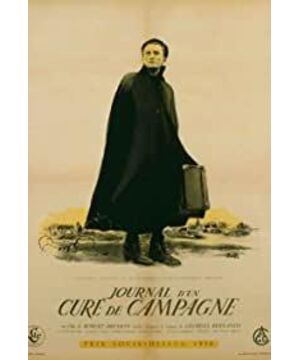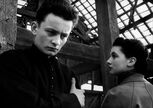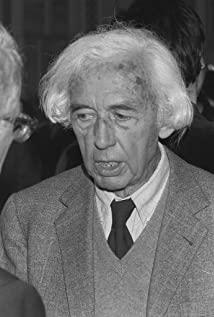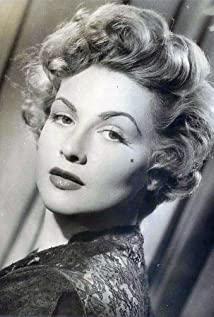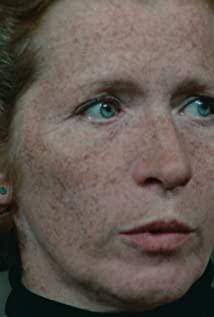Homage to Bernanos (excerpt), March 12, 1951, Paris-Sorbonne University, Centre catholique des intellectuels français, University of Paris-Sorbonne
Robert Barrat: In our previous meeting to prepare for this dialogue, I remember you talked about your method of making a film: "I make a film just like I want to write a poem. I Look for a tone." You also explained that it was this tone that you kept in your mind when shooting the scene. This means that for the operators, mechanics and assistants, “it will be very annoying.” Only when they see the edited film, they will be able to discover the inner unity of this poetry.
Robert Bresson: First of all, I want to use this platform to publicly defend an accusation against me. I was accused of contempt and distrust of professional actors. On the contrary, I appreciate-highly and unreservedly-the impressive and admirable skills they display, which requires a series of irreconcilable talents, the superb abilities of the human mind. It is also a kind of humility and obedience of the mind, sincerity and deceit, laissez-faire and self-discipline, so I admit that it often seems to me almost incredible.
However, if I request—if I use—an unknown actor, an amateur, or a novice actor; if I avoid dramatic themes and build a storyline with many plots; if I simplify the scenery to just one frame, it Gradually retreat and disappear completely when the character's face appears. That's because what I want to express is not an action, not an event, but a feeling.
When a professional actor is brought into the realm of feeling, he will experience a strange embarrassment when I aim the camera at him: he finds that the habits cultivated on the stage or other films restrict him; those in the center The facts, events, everything about the importance of position—those small muscle twitches, those accustomed habits—in a word—it is his talent that interferes and prevents him from providing me with what I ask for. thing. So I experienced that these kinds of obstacles-strangely-lie between us, actually hiding him from me, like a mask.
I would love to try to explain how the creator of this movie-this amazing camera, our main tool-is at the same time our main and most difficult enemy. It means that the camera records everything and captures everything because of a kind of mechanical indifference and clumsiness belonging to the machine.
Charlie Chaplin (Charlie Chaplin) told me this story when passing through Paris a few years before the war: "Imagine a greatest screen actress, imagine Greta Garbo"—— This is what Chaplin said, not me—"Imagine she is performing her play perfectly, but the weather is very hot, there are many flies flying in the studio, flying by her...While she continues to play When her acting was perfect, she thought: "Wait, what if a fly lands on my nose!" The camera recorded the thought."
The word "take" is synonymous with capture. It has to do with capturing an actor—not an actor as an actor, but an actor as a creature—to surprise him, grasp him, capture some of the characteristics of his face, and capture some that can produce the rarest, most precious, and most secretive features. Thing-something that will provide me with some sparks of the key to the mystery. Amateur or novice actors are less conscious, more naive, more direct, and more patient, able to put themselves into this experience more thoroughly. You will notice how far this conception of film actors differs from the traditional conception. It can lead to an analogy, that is, our conception of models used by painters or sculptors.
Robert Baja, now I want to return to what you said earlier. Indeed, when I work, I can often hear the operators, the illuminators, and even the entire crew whispering — often when I’m in a corner looking at me and saying — “This movie is really annoying” or “This movie will come in the future. It will be very annoying."
The first explanation is that the film is indeed annoying, or will be annoying. Another explanation is that the lighting crews and controllers who have participated in countless film productions throughout the year and experienced these films in a theater way have seen many dramas full of behaviors, words and expressions expressed in extreme ways. Of filming. As a result, all the content under my guidance seems to them boring and lack of expressiveness. However, in fact, my approach is quite another matter. What I pursue is not the expression through behavior, speech, and imitation, but the expression through the rhythm and combination of the position, relationship, and quantity of the image. The value of an image must be, above all, an exchange value. But for this kind of exchange to work, the images must have some things in common and participate in a kind of unity. Because of this, my first task is to give the characters an affinity for each other and require all actors to speak in the same way.
An image can be compared to a word in a sentence. Poets have refined their terms, and they often voluntarily choose monotonous and boring terms. And when one of the most common and stale words is used in the right place, it suddenly shines with extraordinary aura.
Notes:
Georges Bernanos (Georges Bernanos, 1888-1948) was a French soldier, writer, playwright, and Catholic who supported the monarchy. His works often explore the human struggle between good and evil in the soul, which was adapted into a movie in addition to the publication in 1936 of "Diary of a Country Priest", and Bresson's "Mouchette" ( Mouchette ), Maurice • Sous le soleil de Satan (1987) by Maurice Pialat (Maurice Pialat ), as well as “Gal”, which was published before his death, was often shown on stage and screen, and was also adapted into an opera. Dialogues des Carmélites ( Dialogues des Carmélites ).
The University of Paris-Sorbonne (University of Paris-Sorbonne), also known as the University of Paris IV, is a public research university established in 1971, and its predecessor is mainly the Faculty of Humanities of the University of Paris. In 2018, it merged with the University of Paris VI and was called the Sorbonne University.
The Centre catholique des intellectuels français (Centre catholique des intellectuels français) was established in 1941 secretly by some philosophers and historians. It was disbanded in 1977. He has participated in the preparations for the Second Vatican Conference for a long time, holding debates, seminars, and academic symposiums every week.
Robert Barrat (Robert Barrat, 1919-1976) French resistance activist, journalist, writer, and political activist.
Charlie Chaplin (Charlie Chaplin, 1889-1977) English comedian, director, producer, editor, composer. A world-class star in the silent film era, his role as a tramp is deeply rooted in the hearts of the people. In 1919, he co-founded the film company United Artists. In 1929 and 1972, he won two Oscar honors.
Greta Garbo (1905-1990) Swedish actor, naturalized as American in 1951. Won three Oscar nominations for Best Actress, and won the Oscar Honor Award in 1954.
In regular film shooting, one of the responsibilities of the take and/or clapper is to assign a unique name to each shot. The naming mode is "a certain volume, a certain field, a certain lens, a certain article". This “take” means a shot taken without interruption. The meaning of this word was added after the film was born. One of the original meanings of “take” is to capture and obtain, so it is synonymous with “capture” in the text. The Chinese word “tiao” does not have this layer. meaning.
View more about Diary of a Country Priest reviews


